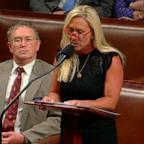Obama's Challenge for the NAACP
He's what the group has worked for, but does his success mean the fight is over?
CINCINNAT, Ohio, July 13, 2008— -- At this year's NAACP convention, the nation's oldest civil rights forum, there is an energy not felt in decades. And there's no mistaking why.
"It's very promising to see someone like Barack Obama doing very well," said Jeanetta Williams, president of the organization's Salt Lake City chapter.
At a time when the black electorate is more unified than ever, opinions have never been more diverse. It's a curious dynamic made loud and clear with the whispered words of the Rev. Jesse Jackson, recently overheard when they were picked up on a microphone the civil rights leader did not know was live.
While sitting on the set of a cable news program, Jackson angrily criticized Obama for "talking down to black people" and said he wanted to cut off a sensitive part of the senator's anatomy.
Obama has broken with the civil rights tradition by telling blacks that some of their problems they need to fix themselves. Among other things, he has criticized black men for not taking full responsibility for their children, and chided parents for the food they serve their families.
The general response to these kinds of remarks has not reached the level heard when Bill Cosby hit the black community with similar tough love, but the Jackson-Obama rift has turned up the volume on a conversation simmering in the black community for years.
It's a debate over ideas and legacy between the civil rights lions of Jackson's generation and the younger moderates in this multi-cultural age of Obama.
"I think there's a little bit of jealousy, a little bit of saying, 'I paved the way for you to do that,'" Williams said.
Others at the NAACP convention acknowledged the need to bridge the two generations.
"I don't think Obama can be elected without the civil rights community," said Steven Reece, an official in the Cincinnati chapter of the NAACP. "And I don't think the civil rights community can enjoy the success without Obama."
It's not the only uncertainty Obama's rise has created. As the NAACP prepares to turn 100 next year, activists are faced with a new question that could define the next hundred: What effect would an African-American in the White House have on the civil rights movement that helped get him there?




